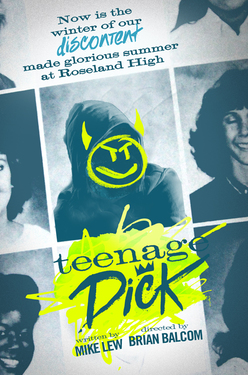
 [rating=2]Shakespeare wrote “Richard III” during the bubonic plague of 1592-93 when the Crown ordered all theaters in London closed. What an interesting coincidence that “Teenage Dick”, a modern spinoff of “Richard III”, is being performed during a similar theater shutdown. With the current coronavirus pandemic, artistic director Jeremy Wechsler and Chicago’s Theater Wit have decided to experiment with a recorded production accessible remotely via streaming video. The production will follow the same schedule and run, as if the shows were being performed live.
[rating=2]Shakespeare wrote “Richard III” during the bubonic plague of 1592-93 when the Crown ordered all theaters in London closed. What an interesting coincidence that “Teenage Dick”, a modern spinoff of “Richard III”, is being performed during a similar theater shutdown. With the current coronavirus pandemic, artistic director Jeremy Wechsler and Chicago’s Theater Wit have decided to experiment with a recorded production accessible remotely via streaming video. The production will follow the same schedule and run, as if the shows were being performed live.
Written by Mike Lew and directed by Brian Balcom, “Teenage Dick” reimagines the short reign of Shakespeare’s King Richard III in the context of a modern American high school. The show features the physically disabled Richard Gloucester (MacGregor Arney), who suffers from cerebral palsy. Picked on mercilessly because of his physical disability and his propensity to wax poetic, Richard schemes to rise above his lowly status and become senior class president of Roseland High. But at heart, he is not a nice person: He takes the words of Machiavelli to heart and then goes one step beyond. His devious mind, combined with his innate cleverness and his overreaction to circumstances, makes this narrative a horribly sad and brutal one. This tale is above and beyond a mere student government power grab: It is somewhat reminiscent of Columbine High School but with less focus on physical violence and more on psychological manipulation. The name Dick is no accident: It is used as an insult in this play, and not without reason.
With an emphasis on secondary school and coming-of-age, “Teenage Dick” should appeal to a mostly younger audience. In the beginning, we see Richard, the popular football player Eddie (Ty Fanning), and 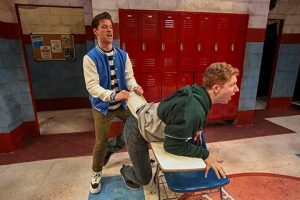 the overly anxious Clarissa (Kathleen Niemann) all vying to become class president. Their teacher Elizabeth York (Liz Cloud) takes an interest in the election and especially wants to mentor Richard. But she is a very uneven character and tries much too hard to be liked. Barbara “Buck” (Tamara Rozofsky) is a fellow student in a wheelchair, who can relate to Richard’s physical limitations; her character gives us additional insight as to how disabled people are often marginalized at school, if not also teased and otherwise treated cruelly by classmates.
the overly anxious Clarissa (Kathleen Niemann) all vying to become class president. Their teacher Elizabeth York (Liz Cloud) takes an interest in the election and especially wants to mentor Richard. But she is a very uneven character and tries much too hard to be liked. Barbara “Buck” (Tamara Rozofsky) is a fellow student in a wheelchair, who can relate to Richard’s physical limitations; her character gives us additional insight as to how disabled people are often marginalized at school, if not also teased and otherwise treated cruelly by classmates.
While all the students (other than Richard) seem rather superficial, the exception is Anne Margaret (Courtney Rikki Green). Green shines in her role and empathetically portrays a very deep character who is more than just a love interest. As a dancer who is interested in physical movement, she gives voice to how able-bodied individuals perceive of the disabled. She brings to light how their worlds may or may not intersect, especially in the context of teenage relationships. She sees past Richard’s disability for the person he is (or who she thinks he is).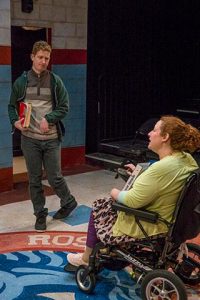
Although there are a few funny moments in the show, the humor is mainly based on overacting. So from time to time, my proverbial teenage eyeroll put me in good stead. But the story improves as it goes along, and the ending is quite good—which I won’t give away. Above all, the meaning behind the play should resonate with many people, especially those who may have been bullied via social media or may know of somebody who has been.
Filmed using two cameras and subsequently edited, this unique performance of “Teenage Dick” is like watching an old-fashioned TV program, where video production standards are not as high as what we might expect in a movie or on television today. This can all be forgiven, since the theatre producers are not video professionals. The best part about creating this recording, then, is that it can be made accessible to an audience that might not be able to attend a live show. As artistic director Wechsler has stated, “We wanted everyone, regardless of their health status, physical limitations, or…. where they are in the world, to see the fantastic work of these artists.”
Very useful is the pre-show, where we receive a recorded tour of the theater, the set, and the props. This helps to give us a feel for the presentation, considering that we do not witness the actual set and only have what we see on a small screen to go by. This begs an important point: that viewing the video stream makes it almost impossible to comment on certain aspects of the presentation, such as Balcom’s stage directing; for this competes with the directing of the video. We see fade-outs and fade-ins; we witness the props changing before our eyes; we watch the characters making their entrances and exits, and so forth, but it is difficult to judge how well these things have been accomplished. By watching remotely, we miss the projection design and the specialized lighting effects. We get a hint of the choreography but not its full effect. Most problematic is the sound. It varies in quality and volume, and the mix is not done well when music is involved. I will assume that there is no issue with the sound design in person but that the fault probably lies in the recording. The question is whether this deficit accentuates our difficulty in understanding Arney’s monologues delivered in Shakespearean English. He seems to talk too fast in general.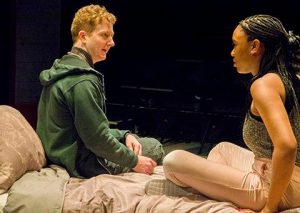
What I enjoyed most were the ironies having nothing to do with the script per se. The most important of these is that Roseland High School is an allusion to London’s Rose Theatre. This was the venue where Shakespeare produced his series of Henry IV plays, shut down due to the plague in the middle of its run. This left Shakespeare out of work and in dire financial straits. Today as actors and production crews are unable to work due to the virus, they too are potentially suffering hardships. Playwright Lew assesses the situation this way: “Amidst a health catastrophe that’s brought Broadway itself to a standstill, I’m thrilled Theater Wit has found a safe way to keep our show running and keep honoring the hard work and immense talent of our artists. I urge Chicagoans to witness ‘Teenage Dick’ as much for the experience of the play as for joining this experiment in social connecting despite social distancing.” Yet in watching the video, I was disappointed to see audience members fail to sit at least one seat apart as they watched the live performance, as was recommended earlier this week. This is not a rebuke of the producers but a reminder that everybody—even young people—must adapt quickly to the new normal of increasing social distance and isolation so that all of us can better weather the storm of whatever comes next.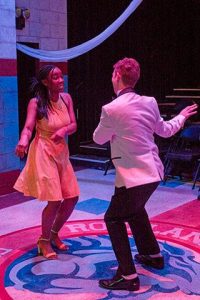
All that being said, I had much higher ambitions for this production. Considering how hard everybody worked to get this play to its viewing audience, I honestly wanted to like it more.
“Teenage Dick”, produced by Theater Wit, is playing from the comfort of your computer, tablet, phone or smart TV, through April 19, 2020.
Remote view tickets are $28.
Thursdays, Fridays, and Saturdays – 8:00 p.m.
Sundays – 2:30 p.m.
(All times CST)
Here’s how it works: Patrons pick a “remote view” date and time from Theater Wit’s performance calendar, same as always. Ten minutes before the show begins, each remote viewer will receive an email with a private URL and password to watch the performance on a private Vimeo stream.
Teenage Dick runs 100 minutes, no intermission. The number of video streams are capped at 98 per show, corresponding with the total number of seats in the live theater. The streaming can be paused on your device whenever you wish. However, it can only be played forward (and not back).
After each performance, remote viewers may choose to join the cast and crew and fellow audience members for an online discussion over video conference (via GoToMeeting).
To purchase tickets and for more information on this new remote view option for “Teenage Dick”, visit https://www.theaterwit.org or call (773) 975-8150.
Important note: All of the actors and production crew are being paid in full through the end of the run as if the show had been performed before a live audience.
You can donate to TheaterWit at https://www.theaterwit.org to show your support for live theatre in Chicago and the people who make it happen. Note that Theater Wit is a 501(c)(3) charitable organization.
To see what others are saying, visit www.theatreinchicago.com, go to Review Round-Up and click at “Teenage Dick”.







More Stories
“Dummy in Diaspora”
“The Magic School Bus: Lost in the Solar System”
“February House” reviewed by Julia W. Rath